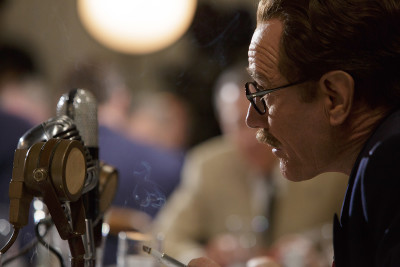In the mid-20th century, a streak of anti-communist paranoia swept the United States as it entered the Cold War. This time of fearful conservatism proved deadly to Hollywood, where liberal filmmakers’ politics caused uproars on and off set.
The House Un-American Activities Committee was formed, and Hollywood created the Motion Picture Alliance for the Preservation of American Ideals in response to keep the industry afloat amidst waves of controversy. Together, these organizations doggedly pursued actors and filmmakers in a now-infamous witch hunt, demanding of each,

Ten filmmakers refused to comply with these wishes, choosing instead to dodge the famous question. This resulted in the “Hollywood Ten” being held in contempt of Congress and sentenced to prison, in addition to being blacklisted. This led to bland, formulaic movies and put many talented filmmakers out of work. Some even lost their lives due to stress and suicide. It was a dark time for Hollywood.
“Trumbo” catalogues the life of communist Dalton Trumbo (Bryan Cranston), one of the Hollywood Ten and a screenwriter of the movies “Roman Holiday” and “The Brave One.” Interestingly enough, Trumbo was not originally credited for his work due to the blacklist.
After serving his time, Trumbo wrote an incredible number of popular and award-winning films under pseudonyms to avoid boycotts of his work, and continued to make a living doing what he did best — screenwriting.
Cranston’s Trumbo is a man whose exaggerated posture, facial expressions and mannerisms make him seem like a character rather than a real person. Indeed, every sentence out of his mouth is a flowing witticism. He speaks like one of the characters he wrote — radical, passionate and constantly smoking.
Though garnering attention is the main asset of this film, Cranston’s physical and vocal imitation is distracts from the core of the man and the issues for which he fought. Cranston is a masterful actor, however, so the emotion and heart of Trumbo is still fully realized in his squinting, bespectacled face.
He’s fun to watch and listen to, with quips to rival Oscar Wilde and a laughably big personality, perfectly complemented by his genuine affection for his family. Trumbo’s snappy jokes and long-winded explanations of his politics can be tiring, but this actually works to the character’s advantage.
It’s not unbelievable that he would make many enemies, but the enemies themselves are in some ways far-fetched. Most are depicted as bumbling fools, with the notable exception of John Wayne (David James Elliott) and Hedda Hopper (Helen Mirren), a conservative journalist who leads the tirade against the supposed threat of communism in Hollywood.
Played with delightful malice, Mirren’s Hopper is a perfect mix of Rita Skeeter and Dolores Umbridge of the “Harry Potter” series, smiling demurely as she threatens a studio executive with racial slurs and vulgar language. Profanity from such a proper lady is jarring in a terrifying way.
The supporting cast of “Trumbo” is truly superb. Diane Lane, though often forced to merely look concerned in her role as Dalton’s wife Cleo, uses a very short amount of time to build a unique, authentic character. She’s believable as someone who can not only stand up to Trumbo’s frenzied fury, but also force him to change his mind in times of need.
Edward Robinson (Michael Stuhlbarg) is easy to sympathize with despite Trumbo’s opinion of him due to Stuhlbarg’s subdued, earnest portrayal. Additionally, Kirk Douglas (Dean O’Gorman, with the help of prosthetics) is delightful to watch for any fan of classic Hollywood stars.
John Goodman’s Frank King steals scenes with his turn as a blunt and ridiculous small-time studio head. The entire film is funny, but Goodman’s scenes are laugh-out-loud hilarious.
A somewhat surprising casting decision, Louis C.K., playing Trumbo’s “frenemy” Arlen Hird, is spectacular. He plays his usual grumpy loser, which modernizes the well-constructed sets and costumes of the film’s period and simultaneously brings Trumbo himself down to Earth.
Hird is the practical man to Trumbo’s dreamer in many ways, and is the one truly concerned with the politics behind the controversy, rather than just the controversy itself.
Cranston is the only aspect of “Trumbo” on everyone’s tongue, signifying in so many words that the film itself falls short of notability or entertainment. Such is not the case with “Trumbo.” The film is in many ways like Cranston’s character — flawed and self-obsessed, but also passionate, smart and entertaining. It is, after all, a Hollywood film about Hollywood.









































































































